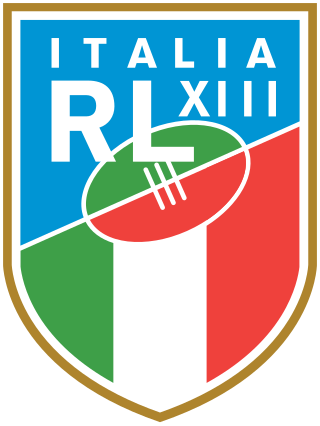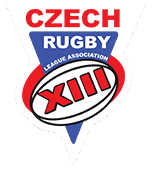
The Bledisloe Cup is an annual rugby union competition between the national teams of Australia's Wallabies and New Zealand's All Blacks that has been contested since the 1930s. The frequency that the competition is held has varied, as has the number of matches played in each tournament, but it currently consists of an annual three-match series, reduced to a two-match series in World Cup years, with two of the matches counting towards The Rugby Championship. New Zealand have had the most success, winning the trophy in 2023 for the 51st time and 21st in succession, while Australia have won the trophy 12 times.

The France national rugby league team represents France in international rugby league matches. They are referred to as les Chanticleers or less commonly as les Tricolores. The team is run under the auspices of the Fédération Française de Rugby à XIII.

The Russia national rugby league team, nicknamed The Bears, represents Russia in international rugby league tournaments and other rugby league fixtures. The Bears, played their first fixtures against two British club sides: York Wasps and Fulham RLFC. In 2013, Russia became a full member of the Rugby League International Federation.

The International Rugby League (IRL) is the global governing body for the sport of rugby league football. Previously known as the Rugby League Imperial Board, the International Rugby League Board and latterly the Rugby League International Federation, the IRL is responsible for the Laws of the Game, the development, organisation and governance of rugby leagues internationally, and for the sport's major international tournaments; most notably the Rugby League World Cup.

The Greece national rugby league team represents Greece in rugby league. The team has been participating in international competition since 2003.

The Netherlands national rugby league team is the national rugby league team of The Netherlands. It was formed in January 2003. The national team played its first international match in 2003 against Scotland A, where they lost 22–18.

The Italy national rugby league team represents Italy in rugby league football. With origins dating back to the 1950s and 1960s, the team has competed regularly in international competitions since 2008, when their current governing body, the Federazione Italiana Rugby League, was formed. They are currently ranked 13th in the IRL World Rankings.
The Georgia national rugby league team represented Georgia in rugby league football. It played its first international game in 2005. The Georgian team play in a red jersey with a white cross on the front. Before a match, they performed their own "haka", called the Perkhuli.
The Serbia national rugby league team represents Serbia in the sport of rugby league football. They have competed in international competition since 2003 under the administration of the Serbian Rugby League.
Rugby league is a team sport that is relatively new to Greece.

Rugby league is a team sport that is played in Serbia, which now has almost 1000 registered players nationwide, many of which are juniors. Belgrade and Novi Sad are the two main bases for the sport, producing most of the country's players. The most successful Serbian club side are the Dorćol Spiders who have won the most premierships. The other club Red Star Belgrade who defeated Dorćol in the deciding game to claim the minor premiership.
On 11 July 1998 the first ever 13 a side rugby league match was played between Italia and Lebanon, which took place at Leichhardt Oval - Sydney - Australia, the match was known as 'The Mediterranean Cup'. A crowd of almost 10,000 watched as these two emerging nations battled it out in a torrid affair. Former first grade players such as Frank Napoli, Chris St Clair, John Elias, David Baysarri and Darren Maroon represented their country of origin. The match was refereed by Tony Archer and Lebanon defeated a gallant Italy. The Mediterranean Cup was played before the Balmain Tigers and North Queensland Cowboys 1st grade match.
Rugby league in the Netherlands is a minor sport played by five clubs.
This article contains information on rugby league played in 2006. The season commenced with the World Club Challenge in England in February and concluded with the Tri-Nations Final in Australia in November.
The Women's Rugby League World Cup is an international rugby league tournament, contested by the women's national team of the International Rugby League (IRL). The competition has been held since 2000 and was incorporated into the Festival of World Cups in 2008 until 2017 when it became a centrepiece event along with the men's competition. Under the current format, eight teams are separated into two groups of four with the top two in each group qualifying for the semi-finals.

The Czech Republic national rugby league team was established to broaden the skills of the rugby union team. The team has competed in a number of competitions and hosted the Slavic Cup in 2006.
The Euro-Med Challenge is an international rugby league football competition. The competition is organized by the Rugby League European Federation and is designed to promote the sport of rugby league in Europe and the Mediterranean Region. The Euro Med Challenge is a second or third tier competition for European rugby league teams.

The EPCR Challenge Cup is an annual rugby union competition organised by European Professional Club Rugby (EPCR). It is the second-tier competition for clubs based in European leagues behind the European Rugby Champions Cup. From its inception in 1996 to 2014, it was known as the European Challenge Cup and governed by European Rugby Cup (ERC). Following disagreements in the structure of the tournament's format and division of revenue, the English and French leagues withdrew to form the EPCR, which organized the Challenge Cup and the Champions Cup since the 2014–15 season.

Rugby Europe is the administrative body for rugby union in Europe. It was formed in 1999 to promote, develop, organise, and administer the game of rugby in Europe under the authority of World Rugby. However, it is not responsible for the organisation of the Six Nations Championship or the competitions run by European Professional Club Rugby.
The 2021 Men's Rugby League World Cup qualification was the qualifying process which will decide the 8 teams that would join the 8 quarter-finalists from the 2017 World Cup including the hosts England, who received an automatic spot, at the 2021 Rugby League World Cup. The process commenced in June 2018, with the commencement of the 2018–19 Rugby League European Championship C tournament, which acted as the first round for European qualification.










